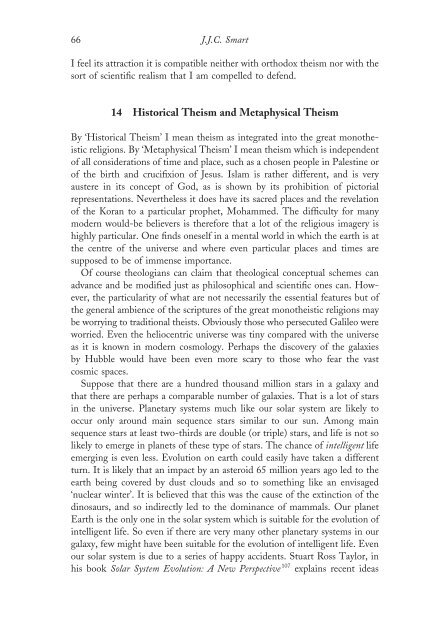Atheism and Theism JJ Haldane - Common Sense Atheism
Atheism and Theism JJ Haldane - Common Sense Atheism
Atheism and Theism JJ Haldane - Common Sense Atheism
Create successful ePaper yourself
Turn your PDF publications into a flip-book with our unique Google optimized e-Paper software.
66 J.J.C. Smart<br />
I feel its attraction it is compatible neither with orthodox theism nor with the<br />
sort of scientific realism that I am compelled to defend.<br />
14 Historical <strong>Theism</strong> <strong>and</strong> Metaphysical <strong>Theism</strong><br />
By ‘Historical <strong>Theism</strong>’ I mean theism as integrated into the great monotheistic<br />
religions. By ‘Metaphysical <strong>Theism</strong>’ I mean theism which is independent<br />
of all considerations of time <strong>and</strong> place, such as a chosen people in Palestine or<br />
of the birth <strong>and</strong> crucifixion of Jesus. Islam is rather different, <strong>and</strong> is very<br />
austere in its concept of God, as is shown by its prohibition of pictorial<br />
representations. Nevertheless it does have its sacred places <strong>and</strong> the revelation<br />
of the Koran to a particular prophet, Mohammed. The difficulty for many<br />
modern would-be believers is therefore that a lot of the religious imagery is<br />
highly particular. One finds oneself in a mental world in which the earth is at<br />
the centre of the universe <strong>and</strong> where even particular places <strong>and</strong> times are<br />
supposed to be of immense importance.<br />
Of course theologians can claim that theological conceptual schemes can<br />
advance <strong>and</strong> be modified just as philosophical <strong>and</strong> scientific ones can. However,<br />
the particularity of what are not necessarily the essential features but of<br />
the general ambience of the scriptures of the great monotheistic religions may<br />
be worrying to traditional theists. Obviously those who persecuted Galileo were<br />
worried. Even the heliocentric universe was tiny compared with the universe<br />
as it is known in modern cosmology. Perhaps the discovery of the galaxies<br />
by Hubble would have been even more scary to those who fear the vast<br />
cosmic spaces.<br />
Suppose that there are a hundred thous<strong>and</strong> million stars in a galaxy <strong>and</strong><br />
that there are perhaps a comparable number of galaxies. That is a lot of stars<br />
in the universe. Planetary systems much like our solar system are likely to<br />
occur only around main sequence stars similar to our sun. Among main<br />
sequence stars at least two-thirds are double (or triple) stars, <strong>and</strong> life is not so<br />
likely to emerge in planets of these type of stars. The chance of intelligent life<br />
emerging is even less. Evolution on earth could easily have taken a different<br />
turn. It is likely that an impact by an asteroid 65 million years ago led to the<br />
earth being covered by dust clouds <strong>and</strong> so to something like an envisaged<br />
‘nuclear winter’. It is believed that this was the cause of the extinction of the<br />
dinosaurs, <strong>and</strong> so indirectly led to the dominance of mammals. Our planet<br />
Earth is the only one in the solar system which is suitable for the evolution of<br />
intelligent life. So even if there are very many other planetary systems in our<br />
galaxy, few might have been suitable for the evolution of intelligent life. Even<br />
our solar system is due to a series of happy accidents. Stuart Ross Taylor, in<br />
his book Solar System Evolution: A New Perspective 107 explains recent ideas

















